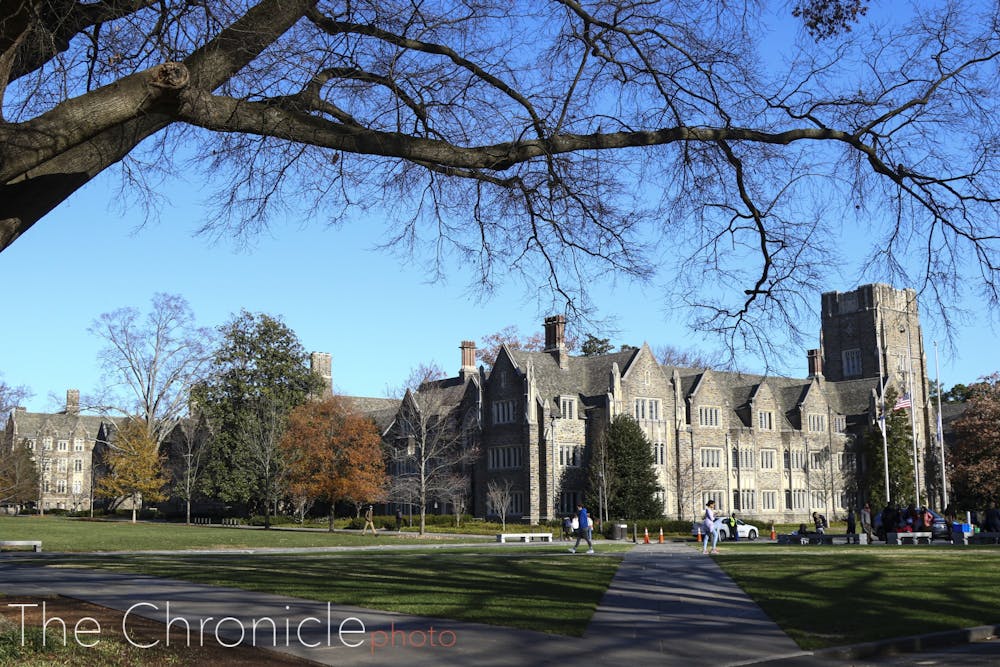A graduate of the Fuqua School of Business is suing Duke due to alleged violations of the Rehabilitation Act and the Americans with Disabilities Act.
The plaintiffs are Mary Fernandez, Fuqua ‘20, and the National Federation of the Blind, of which Fernandez, who is blind, is a member. The complaint—filed June 4 in federal court in North Carolina—alleges violations ranging from inadequate course materials to DukeHub being inaccessible as a course registration system.
The complaint describes Fernandez’s experience with Duke as “nightmarish,” alleging “failed and broken promises, unfair disadvantage and discrimination, and an educational experience that was inferior to what she was entitled and what others received.” Fernandez was “emotionally exhausted, depressed, and anxious” after her time at Duke, according to the complaint.
Michael Schoenfeld, vice president for public affairs and government relations, declined to comment on pending litigation.
The lawsuit alleges that, when Fernandez applied to Fuqua’s MBA program in November 2017, she was forced to submit a paper application due to the inaccessibility of the web-based application, which took “far longer” than her other MBA applications.
Following Fernandez’s acceptance in March 2018, the complaint states that she met with Rebecca McMillan, assistant director of student life in Fuqua. McMillan assured Fernandez that she would be provided all the necessary materials for her courses, including Braille textbooks and the ability to take notes on a computer during class.
In July 2018, according to the complaint, Fernandez took a one-week math refresher course for which McMillan provided her hardcopy Braille course materials. She also worked with McMillan to request accommodations through the Student Disability Access Office.
The filing states that Fernandez received a letter from the SDAO later that month granting her priority registration, as well as access to electronic or Braille forms of books, course content and assessments.
However, despite the promised accommodations, the lawsuit alleges that Fernandez was routinely at a disadvantage compared to her peers during the summer before her first year in the MBA program.
Incoming MBA students were required to complete an online math tutorial during Summer 2018, according to the complaint. Fernandez allegedly could not complete the course, as it consisted of video lectures and online math problems that were not usable with screen access software. Duke waived the requirement for Fernandez, according to the complaint, which allegedly left her at a disadvantage when beginning her MBA coursework.
The filing states that Fernandez then had another prerequisite course requirement waived, Business Computer Application, where students learn advanced functions in Excel. The course format included visual instructions and screen captures of Excel embedded in a PDF document, neither of which Fernandez could access. This, the complaint alleges, again put her at another disadvantage, as she did not learn the necessary computer skills that would be important in her future coursework and prospective employment opportunities.
Later, while completing her three-week Global Institute Courses—a set of classes in August 2018—the complaint alleges that Fernandez did not receive accessible course materials until the day or night before class, which did not allow her to properly prepare for lectures. They also lacked the “informative exhibits” that allowed her peers to understand the full context of the information, according to the complaint.
When registering for classes, Fernandez allegedly found that DukeHub was not a fully accessible website for the visually impaired. The complaint claims that she did not have equal access to the course catalog and instead had to go through the registrar’s office to get information about courses. The filing argues that she thus could not make informed decisions when choosing classes like the rest of her peers could.
Throughout the rest of Fernandez’ coursework, the complaint alleges that Duke repeatedly failed to provide her with necessary materials and accommodations. She frequently received passing grades in her classes but the complaint claims she “could have received a higher grade if Duke had provided accessible course materials that allowed her to fully interact with the content.”
Fernandez also allegedly struggled to use the networking and employment resources that Duke provided to students. She was unable to access many of the Career Management Center’s resources for students seeking jobs post-graduation, according to the complaint, as well as the CMC’s resources for alumni.
In addition to a negative impact on her educational experience, the complaint claims that Fernandez experienced a “domino effect” that led her to struggle in many other parts of her life.
“Because Ms. Fernandez was forced to schedule and attend tutoring sessions and use other work arounds to ensure she had learned the course materials, the extra time doing these activities took up time for sleeping, attending recruiting events, and participating in extra-curricular activities,” the complaint reads.
The complaint alleges that Duke violated both the Rehabilitation Act—a 1973 federal law that requires accommodations for people living with disabilities—and the Americans with Disabilities Act by failing to give Fernandez—and other blind students—equal access to its programs and resources.
Fernandez and the NFB demand in the complaint that Duke provide financial compensation for her time and emotional distress, as well as for her attorney fees. Along with damages, they are seeking a declaration that Duke is violating both the ADA and the Rehabilitation Act.
They also request an injunction for Duke to “adopt and implement policies requiring procurement and use of accessible educational and other materials” for all students, including providing alternative formats of course materials and making course registration and employment systems accessible.
Get The Chronicle straight to your inbox
Signup for our weekly newsletter. Cancel at any time.

Leah Boyd is a Pratt senior and a social chair of The Chronicle's 118th volume. She was previously editor-in-chief for Volume 117.

